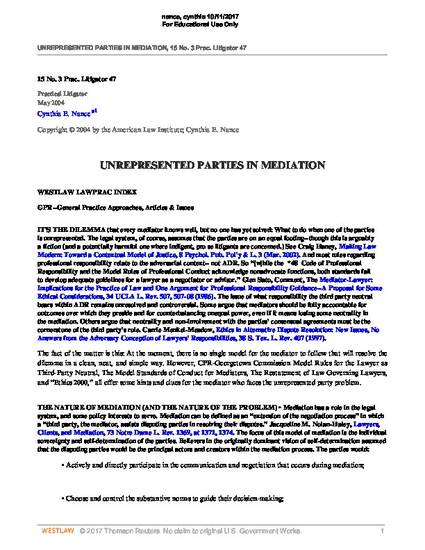
Other
UNREPRESENTED PARTIES IN MEDIATION
(2004)
Abstract
IT'S THE DILEMMA that every mediator knows well, but no one has yet solved: What to do when one of the parties is unrepresented. The legal system, of course, assumes that the parties are on an equal footing--though this is arguably a fiction (and a potentially harmful one where indigent, pro se litigants are concerned.) See Craig Haney, Making Law Modern: Toward a Contextual Model of Justice, 8 Psychol. Pub. Pol'y & L. 3 (Mar. 2002). And most rules regarding professional responsibility relate to the adversarial context-- not ADR. So “[w]hile the *48 Code of Professional Responsibility and the Model Rules of Professional Conduct acknowledge nonadvocate functions, both standards fail to develop adequate guidelines for a lawyer as a negotiator or advisor.” Glen Sato, Comment, The Mediator-Lawyer: Implications for the Practice of Law and One Argument for Professional Responsibility Guidance--A Proposal for Some Ethical Considerations, 34 UCLA L. Rev. 507, 507-08 (1986). The issue of what responsibility the third party neutral bears within ADR remains unresolved and controversial. Some argue that mediators should be fully accountable for outcomes over which they preside and for counterbalancing unequal power, even if it means losing some neutrality in the mediation. Others argue that neutrality and non-involvement with the parties' consensual agreements must be the cornerstone of the third party's role. Carrie Menkel-Meadow, Ethics in Alternative Dispute Resolution: New Issues, No Answers from the Adversary Conception of Lawyers' Responsibilities, 38 S. Tex. L. Rev. 407 (1997).
Disciplines
Publication Date
May, 2004
Citation Information
Cynthia Nance. "UNREPRESENTED PARTIES IN MEDIATION" (2004) Available at: http://works.bepress.com/cynthia-nance/2/
